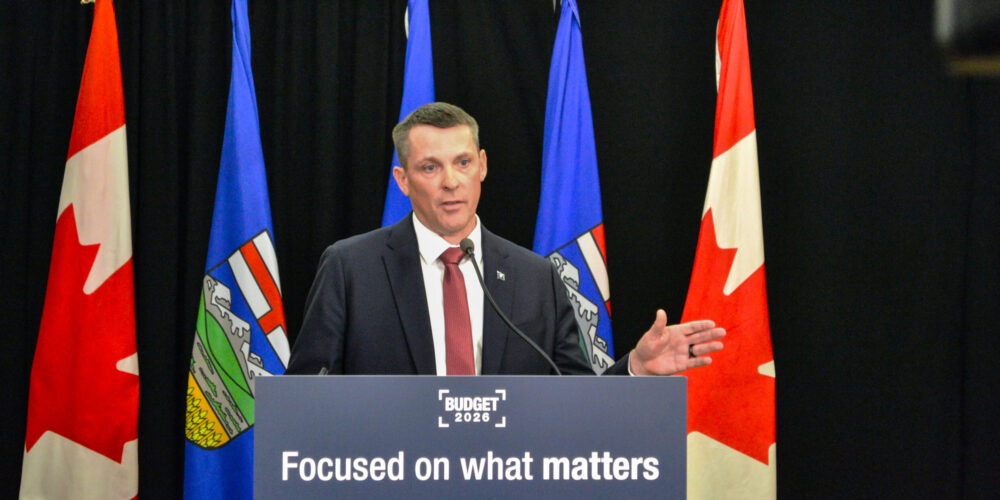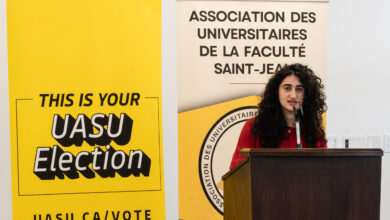SU Elections 2019 Q&A: Undergraduate Board of Governors Representative
 Richard Bagan
Richard BaganThe Board of Governors is the highest decision-making body at the University of Alberta when it comes to financial decisions like domestic and international tuition, residence rent increases, and meal plan rates. Out of the 20 voting members on the board, two of them are undergraduate student representatives: the Students’ Union president and the Board of Governors Representative.
This year, only one candidate is running for this position: third-year political science student and current arts councillor: Rowan Ley.
The following interview has been condensed and simplified for clarity.
In one minute, can you tell us why you are running for Board of Governors Representative?
Rowan Ley: I really care about this institution and the way it has been developing. My dad’s a professor here, so I have been around campus since I was about three feet tall. I care a lot about seeing the university grow and provide a healthy learning environment for students because this institution is part of me.
I’m concerned by the direction some things are going. There are often cuts being made to services students use. Students don’t actually know where most of that money is going.
I would also like to improve the accessibility of the Board of Governors by livestreaming and having more student representation across the province. I think that will allow students to have more influence on future Board of Governors and that’s the kind of legacy I would like to leave on an institution I really care about.
Can you concisely explain your platform?
Ley: Firstly, I want to push for more oversight by the Board of Governors on central administration’s expenses. In universities across North America, central administration costs have gone up a huge amount over the last couple of decades, way out of pace with the number of students or the amount of actual teaching that gets done. It is important we have better oversight to make sure tuition money and taxpayers’ money is not being wasted on administration and that students are getting value for it.
The second thing I want to do differently is I want to work with board of governors representatives and vice-presidents (external) from around the province to increase the number of students on boards of governors around the province. This will give us a stronger voice in future issues.
The last thing I want to do a little differently is I want to push for better accessibility to the Board of Governors. This means livestreaming the sessions but also getting the Board of Governors coming out to the public more on issues that directly affect them.
The Board of Governors is responsible for the university’s fiscal decisions including domestic and international tuition, residence rent, and meal plans. How will you make sure students’ voices are heard on these issues?
Ley: The first thing I would like to do is make the Board of Governors more accessible. Meetings should be livestreamed, it should be easier to watch meetings, and the board should come out in public more and talk to students. These structures are the first way we can make our voices heard.
The second way is by having more students on the Board of Governors. We know this is possible. For example, last year MacEwan got a student added to their board of governors because of years of tireless advocacy by students there, so we know this can be done.
And lastly, for this year itself, it is important for a Board of Governors Representative to get out and talk with students, to get involved with the community, to meet regularly with groups like the Lister Hall Students’ Association, and to hear what students feel about plans that might affect their lives on campus.
As Board of Governors Representative, I promise to be involved in the community and directly going to representative groups that affect their constituents to make sure they weren’t blindsided by something the board did.
If elected, how will you meaningfully consult with students at all campuses on issues that are brought to the Board of Governors?
Ley: The first thing I would want to do is hold at least two town halls throughout the year. These could be in conjunction with other members of the executive or just on my own. I want to do a town hall where students could come in a low-pressure environment and speak directly to their representatives.
The second thing I would make sure to do is to liaise carefully with representative groups like the Lister Hall Students’ Association. The reason I would talk to directly to a representative group in many cases is because sometimes people are over-consulted and do not necessarily enjoy being walked up to and told, “Hey you live in residence what is your opinion on this and be my token person who lives in residence.”
But I would also make sure I would consult with individual members of groups on a voluntary basis by creating Google polls and inviting people to participate in them. I wouldn’t be pushy, and I would try not to irritate people, but I would try to make sure all my decisions came from meaningful consultations and engagement with my constituents.
If there is a motion before the Board of Governors that you believe is against students’ interests, how would you persuade other members of the board to vote against it?
Ley: One of the most important things I have heard from past Board of Governors Representatives is it’s important to talk to other members of the board individually to create a rapport and relationship with them. That trust is really important.
Obviously, just saying something is in the students’ best interests is not going to sway the board. I would try to create a business case as to why something was not in the students’ best interests would also not be in the university’s best interests in the long run as an institution.
If there was a plan to vastly increase residence rates, I would also say this hurts students who would not be able to afford student loans and live in residence, so you are actually going to have decreased filling of residence units, and this is going to hurt residence culture and this is going to hurt residences financially, and even the university in the long run.
So it is all about relating the interests of the university to the interests of students and showing the board that those are actually the same thing.
Joke question: Board of Governors Chair Michael Phair says if you perform a fantastic acapella version of a song, the board will make tuition free for a year. This is the performance of your life. What song would you choose and why?
Ley: First, I would have to say there is no song I could perform well enough for Michael Phair. I would not have the voice quality. But I would still try. I would choose my favourite karaoke song, “Dancing Queen” by ABBA.




